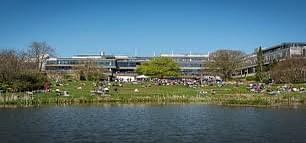Master of Science [M.Sc] (Renewable Energy Engineering)
Field of Study:
$21,125 /Yr
The MPhil in Nuclear Energy, provided by the Department in collaboration with the Cambridge Nuclear Energy Centre, is a one year full-time nuclear technology and business masters for engineers, mathematicians and scientists who wish to make a difference to the problems of climate change and energy security by developing nuclear power generation. The combination of nuclear technology with nuclear policy and business makes the course highly relevant to the challenges of 21st century energy needs, whether in the UK or in countries across the globe.
The MPhil is part of the University of Cambridge's Strategic Energy Initiative in response to the prospect of a nuclear renaissance in the UK and around the world. The aim is to provide a masters-level degree course in Nuclear Energy which will combined nuclear science and technology topics with business, management and policy teaching. Students will be equipped with the skills and information essential to responsible leadership of the international global nuclear industry.
The course recognises that, though the prospects for nuclear energy are now better than they have been for twenty years, the nuclear sector is situated within in a wider market for energy technologies, and has no special right to be developed. The political, economic and social contexts for nuclear power are as important as the technical merits of the designs of reactors and systems. The course therefore has a multi-disciplinary emphasis, aiming to be true to the reality of policy-making and business decision-making.
This course is for students who have a good degree in Engineering or related science subject and who wish to gain the knowledge and skills to build a career in the nuclear and energy sectors. Secondary career paths might include nuclear proliferation prevention, radiological protection, nuclear governance, nuclear medicine and health physics. While the prime focus of the course is to equip students for roles in industry, there is a path towards research through preparation for a PhD programme. The modular open architecture of the course allows students to tailor the degree to suit their background, needs and preferences.
Learning Outcomes
The course will equip its graduates with a wide range of skills and knowledge, enabling them to fully engage in the nuclear sector.
Graduates will have developed a knowledge and understanding of nuclear technology, policy, safety and allied business. They will have received a thorough technical grounding in nuclear power generation, beginning with fundamental concepts and extending to a range of specialist topics. They will also be equipped with an appreciation of the wider social, political and environmental contexts of electricity generation in the 21st century, with a firm grounding in considering issues such as climate change, energy policy and public acceptability.
The programme will cultivate intellectual skills allowing graduates to engage with the business, policy and technical issues that the development and deployment of nuclear energy poses. These include skills in the modelling, simulation and experimental evaluation of nuclear energy systems; critically evaluating and finding alternative solutions to technical problems; applying professional engineering judgment to balance technological, environmental, ethical, economic and public policy considerations; working within an organisation to manage change effectively and respond to changing demand; understanding business practice in the areas of technology management, transfer and exploitation.
The programme will also develop transferable skills enabling graduates to work and progress in teams within and across the nuclear sector, including the management of time and information, the preparation of formal reports in a variety of styles, the deployment of critical reasoning and independent thinking.
Finally, graduates will have research experience having planned, executed, and evaluated an original investigative piece of work through a major dissertation.
Important Dates
| Event | Application Date |
|---|---|
| Application Deadline For 2024 Intake | |
| UCAS Equal Consideration Deadline For 2025 Intake | Jan 29, 2025 |
| Application Deadline For 2025 Intake | Jul 15, 2025 |
Tuition Fees
| Year | 1st Year Fees |
|---|---|
| Tuition Fees | $21125 (GBP 16900) |
Course Guides
1 Year Masters Programs in UK: Best Universities, Popular Programs, and Admissions
Masters in UK: Top Universities, Admission Requirements, Tuition Fees, and Scholarships
Scholarship Grants & Financial Aids
| Name | Scholarship Per Student | Level of Study | Type | |
|---|---|---|---|---|
| Axol Science Scholarship | Scholarship per student$ 2,500/Yr$2,000 | Level Of StudyBachelor | TypeCompany-Sponsored | |
| National Overseas Scholarship | Scholarship per student$ 19,250/Yr$15,400 | Level Of StudyDoctorate | TypeNeed-Based | |
| Aga khan Foundation Scholarships | Scholarship per studentVariable Amount | Level Of StudyMaster | TypeMerit-Based | |
| ASID Foundation Legacy Scholarships | Scholarship per student$ 5,000/Yr$4,000 | Level Of StudyBachelor | TypeMerit-Based | |
| BrokerFish International Student Scholarship | Scholarship per student$ 1,250/Yr$1,000 | Level Of StudyBachelor | TypeMerit-Based | |
| UWL International Ambassador Scholarship | Scholarship per student$ 1,250/Yr$1,000 | Level Of StudyBachelor | TypeCollege-Specific |
Similar Colleges


Robert Gordon University


University of Aberdeen


Aberystwyth University


University of Bath


Cranfield University


Queen's University Belfast


Ulster University


University of Reading

































Comments